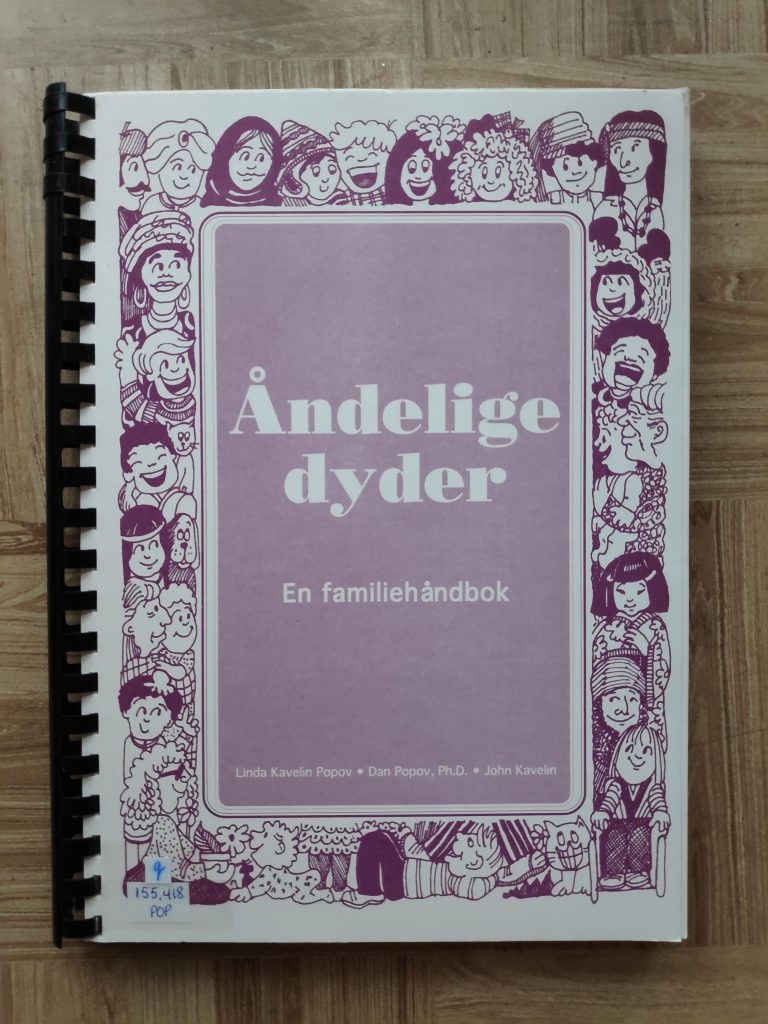
John Patrick Leary tells us that Excellence is one of the few words on his list that has been in decline over the past two centuries.
In the early 1990s, the Norwegian McLellans, using the name Fjellheim Institutt, received permission from Wellspring International Educational Foundation, later known as The Virtues Project, located on Saltspring Island, British Columbia, to publish a Norwegian version of The Virtues Guide, written by Linda Kavelin Popov and Dan Popov, and illustrated by John Kavelin. It was translated and adapted for Norway by Patricia McLellan and Brit J. Drageset.
In many respects, the Virtues Guide is a list of keywords. There were long discussions about the translation of many of these words, although none so intense as the one about the title, which ended up being Åndelig Dyder = Spiritual Virtues. Yes, it seems like smør på flesk = buttering your bacon = redundant, but dyd = virtue, but at the time implies virginity. To expand the concept, so that people could understand that there was more than just this one, often very temporary, virtue – the adjective spiritual was added.
The original English language book was copyrighted 1990, with revisions in 1993 and 1995. The first Norwegian edition was copyrighted 1996, with a second version published in 2004.
The book contains clear guidelines to assist parents in the upbringing of responsible children. These directives include: perceiving learning moments, using the language of virtues, boundary setting, supporting the sacred (according to your family’s view), and providing a spiritual community, all this for the purpose of helping children make moral decisions. There is guidance on how a family meeting can be held and how the family can focus attention on a particular virtue each week.
The book describes 52 spiritual virtues, including Excellence. Each virtue includes a quote from one of the world religions, showing what the virtue is, why to practice it, how to practice it, signifying that you are successful and a confirmation. It is never too late or too early to start practicing the virtues.
Activity
“80% of people find jobs through people they know”, according to LinkedIn. They then add, “The fastest way to find people you know on LinkedIn is importing your email contacts. Once you’ve imported your contacts, you can choose whom to connect to.”
Reflect on how you would want hiring to be handled. How can more transparent processes be set in motion to ensure that job applicants are not discriminated on the basis of cultural, gender and age related information, or on the basis of who one knows and not what one knows?
Nøkkelord 023 Fortreffelighet
John Patrick Leary forteller oss at fortreffelighet er et av de få ordene på hans liste som har vært i tilbakegang de siste to århundrene.
På begynnelsen av 1990-tallet fikk norske McLellans, under navn Fjellheim Institutt, tillatelse fra Wellspring International Educational Foundation, senere kjent som The Virtues Project, som ligger på Saltspring Island, British Columbia, tillatelse til å publisere en norsk versjon av The Virtues Guide , skrevet av Linda Kavelin Popov og Dan Popov, og illustrert av John Kavelin. Den er oversatt og tilpasset norske forhold av Patricia McLellan og Brit J. Drageset.
I mange henseender er Virtues Guide en liste over nøkkelord. Det var lange diskusjoner om oversettelsen av mange av disse ordene, men ingen så intens som den ene om tittelen, som endte med å være åndelige dyder. Ja, det virker som smør på flaske = overflødig, men dyd på den tiden innebar jomfruelighet. Å utvide konseptet slik at folk kunne forstå at det var mer enn bare denne, ofte veldig midlertidig, dydig – den åndelige ble lagt til.
Den originale engelskspråklige boken ble opphavsrettsbeskyttet i 1990, med revisjoner i 1993 og 1995. Den første norske utgaven var utgitt i 1996, med med en reverdert utgave publisert i 2004.
Åndelige dyder inneholder klare retningslinjer for å veilede foreldre i oppdragelsen av ansvarsbevisste barn. Disse retningsliknjene omfatter: å oppfatte lærenemme øyeblikk, bruk av dydenes språk, grensesetting, å støtte det hellige (i henhold til din families overvevisning) og å tilby et åndelig fellesskap, alt dette i den hensikten å hjelpe barn med å ta moralske beslutninger. Det finnes veiledning om hvordan et familiemøte kan avholdes og hvordan familien kan rette oppmerksomheten mot en bestemt dyd hver uke.
Boken beskriver 52 åndelige dyder, herunder fortreffelighet. Hver dyd omfatter et sitat fra en av sje verdensreligioner, og viser hvilket dyd det er, hvorfor man praktiserer den, hvordan man praktiserer den, tegn på at man lykkes og en bekreftelse. Det er aldri for sent eller for tidlig å begynne å praktisere dydene.
Aktivitet
“80% av menneskene finner jobber gjennom personer de kjenner”, ifølge LinkedIn. De legger til, “Den raskeste måten å finne folk du kjenner på LinkedIn, importerer e-postkontakter. Når du har importert kontaktene dine, kan du velge hvem du skal koble til.”
Reflekter over hvordan du vil at ansettelser håndteres. Hvordan kan mer transparente prosesser tas i bruk for å sikre at jobbsøkere ikke diskrimineres på grunnlag av kultur-, kjønns- og aldersrelatert informasjon, eller på grunnlag av hvem de kjenner frem for hva de vet?